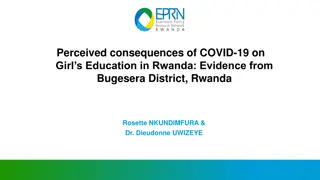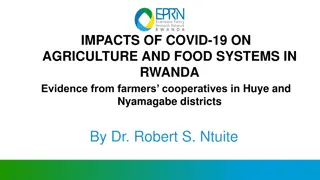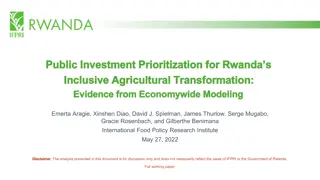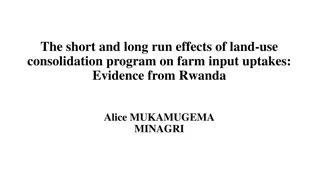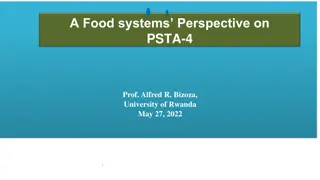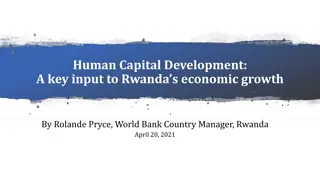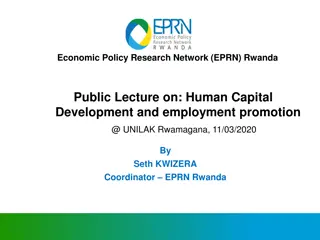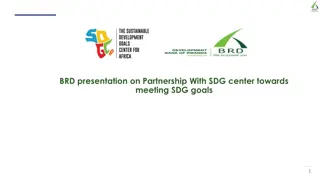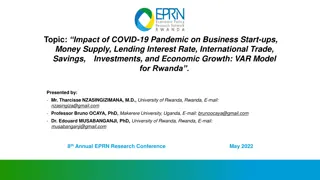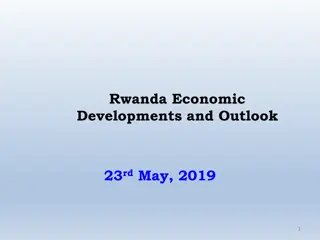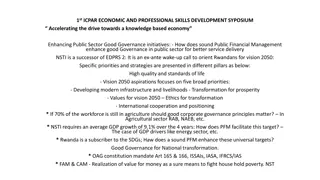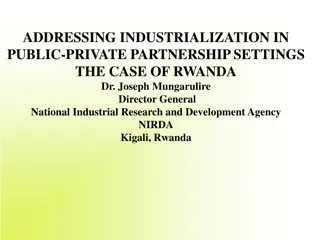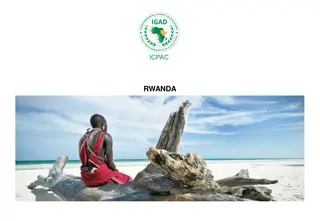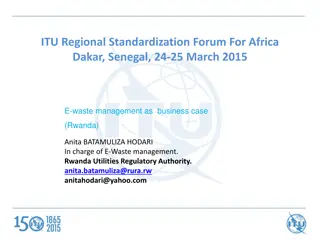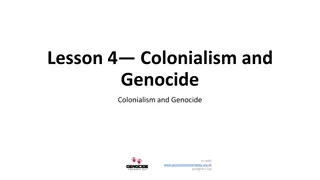Impact of COVID-19 on Food System Transformation in Rwanda
Rwanda's agricultural transformation goals have been challenged by the negative impacts of the COVID-19 pandemic on the food system, affecting production, supply chains, and demand. This paper analyzes these effects on key food production sectors like maize, coffee, and horticulture, highlighting strategies for resilience and adaptation.
Download Presentation

Please find below an Image/Link to download the presentation.
The content on the website is provided AS IS for your information and personal use only. It may not be sold, licensed, or shared on other websites without obtaining consent from the author. Download presentation by click this link. If you encounter any issues during the download, it is possible that the publisher has removed the file from their server.
E N D
Presentation Transcript
IMPACT OF COVID-19 ON FOOD SYSTEM TRANSFORMATION IN RWANDA Final Paper By Jules KAZUNGU, Andre MUNEZERO, MUTIMURA Jean Marie, Mukire GASORE Ramsey, James MUNANURA Regional Research Centre for Integrated Development (RCID Ltd) Cell phone: (250) 0788589224 Email: jules.kazungu@rcidcentre.com Website: http://rcidcentre.com/ May 2022
1. RATIONAL AND OBJECTIVES Rwanda has demonstrated strong commitment to its agricultural transformation targets. The country has been recognized globally for its progress towards meeting the targets outlined in CAADP/Malabo goals and for its alignment with the Sustainable Development Goals. Globally and in Rwanda COVID-19 pandemic has negatively affected all sectors of economies. The crisis has drastically impacted food production and supply chain system from the field to the consumer (Food production, processing, distribution, and demand). In Rwanda and EAC, the COVID-19 resulted in the movement restrictions of workers, changes in demand of consumers, closure of food production facilities, restricted food trade policies, and financial pressures in food supply chain. The objective of this paper was to analyze impact of the COVID-19 pandemic on Food system transformation in Rwanda and highlight effective strategies. 2 Ministry of Trade and Industry 2013 Economic Policy Research Network
2. METHODOLOGY The information presented draws on several sources(policy frameworks, strategies, programs, reports, Country Strategy Papers, etc ) to the impact of COVID-19 on the respective food systems. Data for this study was collected from March 2020 to December 2021. Data for this study was collected from March 2020 to December 2021. For this study, we have focused on impact of Covid- 19 for four food production including maize, coffee and horticulture. Maize is an important crop selected by the government of Rwanda as a top food security and cash crop at local and regional market. Specifically secondary data including data FAOSTAT; FAO Food Price Monitoring and Analysis; and over a dozen studies by FAO, International Food Policy Research Institute (IFPRI), World Bank, NISR, CPI, MINAGRI and others 3 Ministry of Trade and Industry 2013 Economic Policy Research Network
3. FINDINGS 3.1. Impact of covid-19 on food production Maize production (tons) in 2020 in Rwanda s the maize production (in tons). The COVID-19 has a negative impact on maize production between 2019 and February 2020 was 353, 999 tones and reduced from February to June 2020 (94.634 tons) resulting in reduced market availabilities and higher food prices. Coffee Exports crops products in Rwanda (2020) Coffee export quantities and revenues have been fluctuating over the past years. Coffee decreased in exported quantities, but revenues increased by 1.8% mainly due to increased average prices from $3 per/kg to $3.6 per/kg in 2020 due to Covid-19 pandemic. The main exported coffee types were fully washed coffee (77.85%), Semi washed (10.7%), Triage (5.08%) and Natural (4.24%). Horticulture The data from NISR report (SAS 2021A) out of the total recorded production national wide, exported horticulture quantities accounted for 8.5% equivalent to 15,804 MT that generated USD 28.7 million in FY 2020/21. This indicates an increase of 0.3% compared to the revenues generated last fiscal year. This was mainly made up of 13,088 MT of vegetables that generated $13 M, 4,993 MT of fruit that generated $7.7 M, and 1,193.8 MT of Flowers which generated to $7.9 M as indicates in the figure 3 National Institute of Statistics of Rwanda, Seasonal Agricultural Survey (2019, 2020 and 2021). Kigali 4 Ministry of Trade and Industry 2013 Economic Policy Research Network
3.2. IMPACT OF COVID-19 ON FOOD PRICES Average Changes in Food Prices (USD) since the Start of COVID-19 2019 to 2020 Using data extracted via the FAOSTAT data Price Monitor from to estimate cost of living in Rwanda, the figure below indicated that the average price changes across 4 main food products. Specifically, for avocados from 287(2018) to 301 (2020) and Potatoes 259(2019) and 2020(330 USD). 400 368 358 330 350 301 289 287 279 300 265 259 259 239 250 225 200 150 100 50 0 Cassava Maize Avocados Potato 2018 2019 2020 5 Ministry of Trade and Industry 2013 Economic Policy Research Network
3.3. STRATEGIES TO RESPONSE AND MITIGATION MEASURES. To minimize the impact of restrictions, Government has established the Economic Recovery plan to support activities affected by COVID-19. The government of Rwanda rolled out a food relief program in July, 2021 distributing rice, maize, and beans to 211,000 vulnerable households in areas under lockdown. Government promised to inject Rwf 100 billion to start a coronavirus (Covid-19) exit process and counteract the impact of the pandemic on the economy, the funding used to support agriculture and livestock activities. Through its National Strategic Grain Reserves Project, the Government registered storage of 21,302 MT of food staples, composed of 15,571 MT of maize, 181.154 MT of rice and 5,550 MT of beans. Fixed prices for selected essential food consumed by most people like maize, beans, bananas, sugar, rice, cooking oil among others. However, more than 50% of respondents of a RECOVR survey (2020) stated to have reduced food consumption due to a decrease in income. 6 Ministry of Trade and Industry 2013 Economic Policy Research Network
4. CONCLUSIONS AND POLICY RECOMMENDATIONS CONCLUSIONS The study has indicated that due to COVID-19, farmers have an overall limited access to inputs including chemical fertilizers and seeds. This study has found significant changes in food price due to COVID-19 and affected the consumption behaviour of communities. Furthermore, the findings of the study indicate that the Government of Rwanda has established some measures to the response of COVID-19 including minimize the impact of restrictions. Rwanda Government has injected Rwf 100 billion to start a coronavirus (Covid-19) exit process and counteract the impact of the pandemic on the economy, the funding used to support agriculture and livestock activities and good distribution to support vulnerable families who had been affected by the lockdown. The findings also indicate that increasing food insecurity in rural areas raises questions about the resilience of farmers in the face of COVID-19, especially as government support has only targeted urban areas. 7 Ministry of Trade and Industry 2013 Economic Policy Research Network
5. CONCLUSIONS AND RECOMMENDATIONS (cont..) RECOMMENDATIONS 1. There is a need tointroduce new agriculture technologies for farmers with high potential to increaseproductivity; and stimulate collective action for actors in agriculture including collective purchase of inputs. 2. Efforts should be aimed at increasing production and promoting usage of fertilizers from locally and adoption of modern farming technologies in local context and not expecting to import most of the agricultural inputs. 3. Partners in food production and consumption should also invest in capacity-building of farmers and build integrated consultation processes to crowd source the expertise, provide technical expertise, knowledge, and capacity innovation on food production and consumption in Rwanda.. 4. Due to low safety and quality concerns of losses of products, there is need to put in place better infrastructure by minimizing losses & maintains quality of food and stronger postharvest handling capacity (including drying grounds, silos and cold chain) and skill to reduce losses. 8 Ministry of Trade and Industry 2013 Economic Policy Research Network
Thank You EPRN Tel: 0788357648 info@eprnrwanda.org www.eprnrwanda.org






